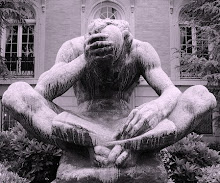How's this for cognitive dissonance? I'm reading the first half of Bloom's Closing of the American Mind because I'm dead set on including something from it in my composition class this term.
For those of you who know me, this is odd enough already. But the really weird thing is that I realized that last night and this morning, I've been reading it whiles listening to The Beatles' Let it Be and the Grateful Dead's Skeletons From the Closet. If Bloom could see me now!
The other strange thing? Some of what he's saying is starting to make sense. I think part of the reason people react so negatively to Bloom's book is that he's essentially calling us all stupid and relying very heavily on essentialist notions. The other reason, though, is that I think people like Bill O'Reilly are (mis)using his notions to further their own agendas. For instance, Papa Bear:
But, Bloom does make some valid points--especially the indictment of so-called "openess." Now I think it was an interesting piece of legerdemain to twist open-mindedness into the new close-mindedness, but that's another day, perhaps. My point is that Bloom's criticism of cultural relativism has a valid foundation, but I think he takes it too far.
Of course, I think my culture is the best (he asserts that I wouldn't because I've been inculcated in cultural relativism since gradeschool, but he obviously isn't thinking of small-town Texas gradeschools). My definition of "my culture" is likely much more narrow and local (ooooooo, more PoMo for Bloom), but I think it's the best...for me. That qualifier is incredibly important in this definition since I'm not claiming any knowledge over other cultures outside of my experience. But again (since this is coming off more critical than I wanted it to), I think he's hitting on an important point--even if his wording and further arguments fail to convince. There is (or should be) an agreed-upon common bond for the United States. Now, if I'm reading him right--and I'd like to think that I am--he's asserting that the commonality of US citizens is going or gone. I disagree. It's there. It's very, very different than the commonality that Bloom imagines, but it is there. It came to the surface in the days after 9/11 (which is why politicians strike that note so often in their speeches, I think) and most anniversaries of the date.
I have no larger, magisterial closing for this post. Just a random, fragmented thought about Bloom's book. Maybe after I teach it and discuss it with my class further, I'll have some new insights to share.
Subscribe to:
Post Comments (Atom)

No comments:
Post a Comment